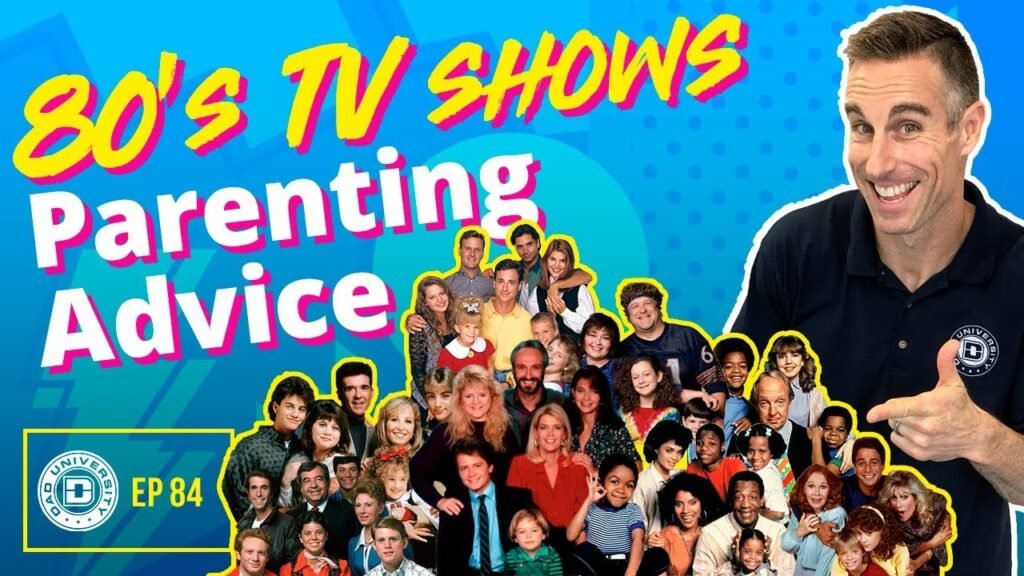It’s always fun to get parenting advice from 80s sitcom characters, isn’t it? Dad University has compiled a list of the top 10 classic 80s TV shows that offer great wisdom and guidance on parenting. From Family Ties to Growing Pains, these shows not only entertained us but also taught us valuable lessons on family values and raising children. So sit back, relax, and take a trip down memory lane as we explore the timeless advice these beloved TV characters have to offer.
As you watch these shows from a different perspective as an adult, you’ll appreciate the depth of knowledge and family values they bring to the table. Join Jason Kreitman and the Dad University team as they discuss the top 10 80s TV shows for parenting advice. From Family Ties to The Cosby Show, each show has its unique way of showcasing the ups and downs of parenthood while offering sound advice and guidance. So grab a snack, tune in, and let’s reminisce about the good old days of classic TV parenting wisdom.
Family Ties
Family Ties is a classic 80s TV show that showcased parenting from a unique perspective. The Keatons, a family of five, included two very liberal parents raising their three children. Alex P. Keaton, the main character, held conservative political views that differed greatly from his parents. Despite these differences, the Keatons managed to navigate through various disagreements while still allowing their children to find their own paths. The show highlighted the importance of open communication and understanding differences within a family.

The Cosby Show
Breaking through stereotypes, The Cosby Show depicted African-American parents, both doctors, raising their five children. The Huxtables faced numerous challenges, from dealing with school issues to teenage relationships. Although the parents maintained a strict household, they always engaged in deep, meaningful conversations with their children, guiding them towards making their own decisions. The show emphasized the significance of effective communication and setting high expectations for children.
Webster
Webster delved into the struggles of a single dad raising a small boy. After his parents passed away, Webster went to live with his father’s friend, George. George, a novice in parenting, faced various challenges that many new dads can relate to. Despite his lack of experience, George’s love for Webster shone through, helping them build a strong bond. The show addressed topics like bullying and adversity, highlighting the importance of unconditional love and support in parenting.
Growing Pains
A psychiatrist dad, Dr. Seaver, interacted with his three distinct children in Growing Pains. Each child had a unique personality, leading to entertaining and insightful interactions within the family. Dr. Seaver and his wife, Carol, portrayed endless reserves of parenting advice in each episode, underscoring the importance of understanding and connecting with each child individually.
Different Strokes
Different Strokes explored diverse family dynamics with a rich adoptive father and two Harlem kids. Mr. Drummond, the caring father figure, often found himself in dilemmas while raising his two adopted sons. Despite coming from different backgrounds, Mr. Drummond always approached parenting with love and empathy, recognizing the importance of open communication and understanding in a blended family.
Full House
In Full House, three men with different parenting techniques raised kids with love and support. From the sports anchor widower, Danny, to his brother-in-law, a rock musician, and his comedian friend, the trio navigated parenting challenges with varied approaches. Despite their differences, their common thread was unconditional love and effective communication, offering valuable parenting advice through their diverse perspectives.
Roseanne
The working-class family in Roseanne tackled serious topics with humor and honesty. The Conners, led by matriarch Roseanne and husband Dan, raised three children while addressing common teen issues and sibling rivalry. The show never shied away from controversy, offering valuable parenting advice through its candid portrayal of family dynamics.
Who’s the Boss
Who’s the Boss featured unique parenting dynamics with a live-in housekeeper and multiple generations under one roof. Angela, a divorced woman, lived with her son, mother, and hired male housekeeper, Tony, who brought along his daughter. The complex parenting interactions between Tony, Angela, and the grandmother made for engaging television, showcasing different perspectives and approaches to raising children.
Happy Days
Happy Days explored coming-of-age themes in a 1950s family, blending logical and emotional parenting approaches. Howard Cunningham, known as Mr. C, exemplified stereotypical middle America parenting with logic and wisdom, while his wife balanced emotion and connection. Together, their parenting advice emphasized the importance of understanding both logic and emotion in raising children.
Brady Bunch
Although originally from the 70s, The Brady Bunch earned a spot on the 80s list for providing exceptional parenting advice. The blended family of eight, with three children from each spouse, navigated life lessons, sibling relationships, and interpersonal skills. The show emphasized love, support, and mutual respect within the family, offering valuable advice on getting along with others and building strong sibling bonds.
These 80s TV shows provided valuable parenting advice by showcasing a wide range of family dynamics and parenting styles. Each show offered unique perspectives on communication, understanding, love, and support within a family, serving as entertaining and educational resources for viewers seeking parenting wisdom from fictional characters.

